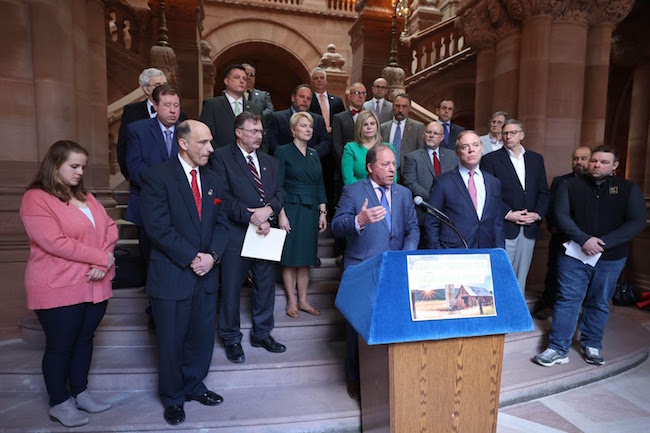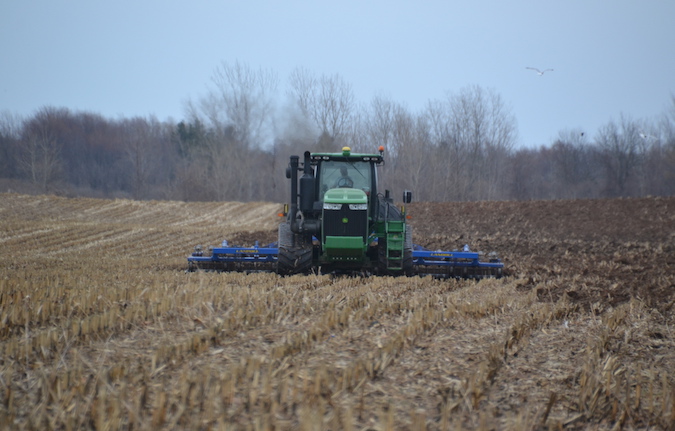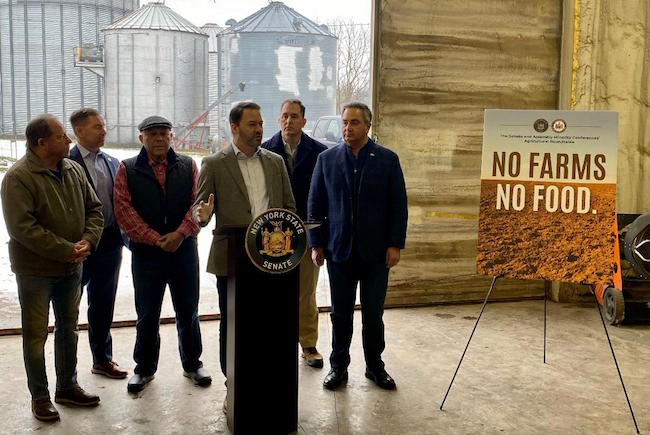Press Release, New York Farm Bureau
New York Farm Bureau released its 2022 state legislative priorities on Monday that address the needs and challenges of the state’s diverse agricultural community in New York State. This included reaction and next steps to address Friday’s Farm Labor Wage Board decision to lower the overtime threshold from 60 to 40 hours over the next decade.
Overtime Threshold Decision
New York Farm Bureau President David Fisher, who is on the Department of Labor’s Farm Labor Wage Board, expressed his serious concerns with the 2-1 decision passed late Friday that will begin dropping the threshold in 2024. He said it will be extremely difficult for farmers and farmworkers to absorb and will change the face of New York agriculture.
He also questioned why more of the submitted video testimony was not played for the full wage board to hear and consider.
“In the end, the decision was made with little deliberation or reflection of the testimony. I would have hoped my fellow board members would have considered more of the impacts that this will have on agriculture,” said President Fisher.
About 70-percent of the testimony was in favor of keeping the overtime threshold at 60. Many farmers and farmworkers testified that anything lower will hurt farmworkers. It will mean fewer hours, less income and force those wanting to work more to find a second job or leave New York State for employment. New York State can’t afford to lose its skilled workforce. Fisher also expressed on the call how this will negatively impact farms operating under thin profit margins as well as New York’s food system and access to local food.
“We saw how important that was in the pandemic for consumers and food banks. We heard testimony that labor will be too expensive, and hours will be limited so there won’t be that excess product to give away,” he said.
New York Farm Bureau is asking Gov. Hochul to find an alternative to the wage board’s recommendation. The organization appreciates that she is looking for a creative solution by proposing a tax credit to offset overtime pay, but many farmers have expressed concern over having to cash flow the high overtime costs before they could see any income from the tax credit, potentially a year later. New York Farm Bureau is asking for more discussion around this with the governor and legislature.
“So much is at stake. This is a priority issue for New York Farm Bureau and all of agriculture. We have worked closely with our partners in the Grow NY Farms coalition and will continue to fight forward together,” said Fisher.
Food Processing
Farmers are still feeling the repercussions from the pandemic with market disruptions, supply shortages, and inflation that has increased the costs for many things needed to farm.
Another NYFB priority aims to alleviate some of the pressure farms experienced when national supply chains were disrupted. While New York State has some outstanding dairy and food processing plants, there is a lack of processing for some commodities, including meat processing.
Nearly all of the USDA certified processing facilities in this state are small scale. While they are critical to the state’s food infrastructure, many times it takes farmers months to secure slots to process livestock, often turning to larger facilities out of state.
“New York Farm Bureau recognizes that there are no easy answers, but it is clear that there is a demand. New York Farm Bureau is asking the state to continue the discussion, perhaps bring interested parties together in a round table to look for needed solutions. This could address supply chain issues that will undoubtedly happen again in the future,” said Eric Ooms, NYFB Vice President.
State Budget
The New York State budget will be a major focus for NYFB as well. The spending plan put forth by the governor is truly one of the best NYFB has seen in years. She fully funds a number of important animal health, promotion and research programs. The governor also is doubling the workforce retention tax credit from $600 to $1,200 which would offset some rising labor costs that continue to put New York farms at a competitive disadvantage. The governor is also proposing to increase an investment tax credit to 20 percent for farms to recoup some expansion costs if they qualify with a tax liability to take it. NYFB is asking for that to be a refundable tax credit.
The governor is also proposing a record $500 million in spending for the Environmental Protection Fund. This includes $2 million more for farmland protection and nutrient management programs, $4 million dollar increases for both Soil and Water Conservation Districts, that help administer sustainability efforts, and invasive species programs. There is also $17 million earmarked for climate resilient farming initiatives.
“This funding addresses another of our major priorities to support farmers in their efforts to adapt to and mitigate climate change. These programs will fund critical programs that will help farmers to continue to invest in soil health practices and support on-farm renewable energy to meet the state’s net-zero climate goals. Farmers are actively involved in reducing carbon emissions, and this funding recognizes that those efforts are working,” said Jeff Williams, NYFB’s Public Policy Director.
The State Senate has already advanced another one of our priorities for the session. It passed Senator Anna Kaplan’s bill (S.6791A) that adjusts how much employers contribute to the unemployment insurance program.
“Because of the need during the pandemic, employers had to pay increased unemployment taxes which can be challenging for farms that operate under thin profit margins. The bill looks to replenish the trust fund without overburdening the state’s small businesses,” said Ooms.
Direct Sales for Farm Beverages
NYFB is prioritizing legislation allowing for direct-to-consumer shipping for all New York produced farm beverages, including beer, cider, and distillates. There are several proposed bills in both the senate and assembly addressing the issue. The Covid-19 Pandemic was extremely challenging for the farm beverage industry.
Tasting rooms were shut down for a time, and these businesses suffered a loss in revenue, like many small businesses. Providing direct-to-consumer sales for craft spirts, hard cider and beer would be a new market opportunity for the industry, provide safe, contactless transactions, and put them on parity with the state’s wineries.
Extended Producer Responsibility Legislation
NYFB is concerned about the Extended Producer Responsibility legislation. This bill looks to pass the cost and responsibility of recycling packaging away from the consumer and to the source of the product, in this case farms and food processors who need things like milk containers, wine bottles and food packaging to sell what they produce. This puts an extraordinary financial burden on to the state’s farms and businesses, a burden that they cannot pass on to consumers, according to the bill.
“Farms may not have been the target of this legislation, but they are among the unintended casualties should it pass without addressing the problem. We are asking lawmakers for an exemption for agriculture,” said Williams.
“In the end, it is imperative that we all work together to expand opportunities and capitalize on what we do well in New York. We have one of the most diverse agricultural sectors in the country. It is worth it to each of us to maintain that strong connection to food and farm production,” said President Fisher.














































































